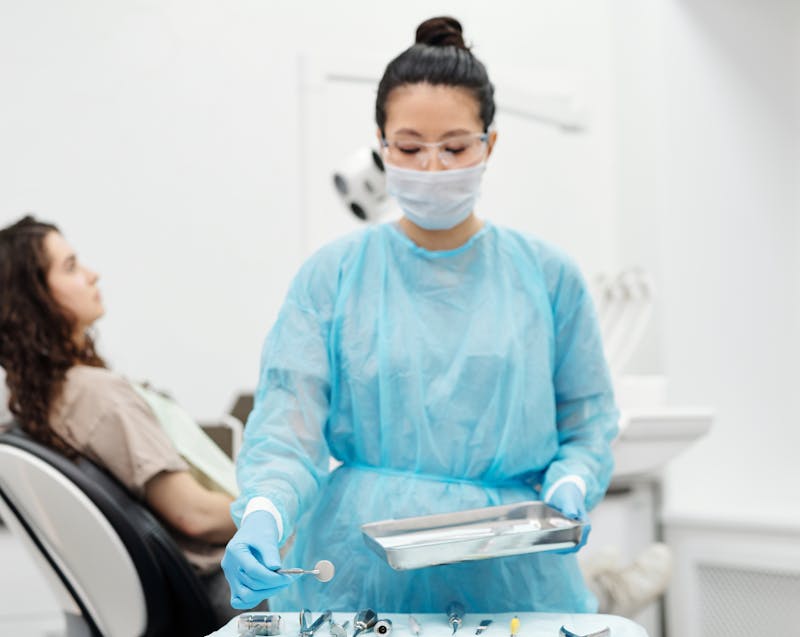
- Identify your family’s specific dental needs — from pediatric to cosmetic or restorative care — before selecting a clinic.
- Verify the dentist’s qualifications, experience, and professional affiliations to ensure credibility and safety.
- Choose a conveniently located clinic with flexible hours and modern equipment that supports comfort and hygiene.
- Read patient reviews and ask for referrals to assess reputation, communication style, and service quality.
- Prioritize clinics that are transparent about costs, insurance options, and payment plans.
- Schedule a consultation to personally evaluate the dentist’s approach, clinic environment, and overall professionalism.
- Trust your instincts — a good dentist should make every family member feel comfortable and cared for.
Choosing a dentist isn’t something most people think deeply about—until they need one. Whether it’s for routine cleanings, dental fillings, or emergency care, finding the right dental professional can make all the difference in your oral health and overall confidence. The best dentists don’t just fix problems—they prevent them, educate patients, and provide care that’s comfortable and trustworthy for the whole family.
Below, we’ll explore in detail how to choose a dentist who meets your family’s unique needs. From checking credentials and technology to evaluating communication style and affordability, this comprehensive guide will help you make a well-informed decision.
Why Choosing the Right Dentist Matters
A dentist plays a long-term role in your family’s health. The relationship you build with your dentist can determine how well you maintain oral hygiene and how confidently you approach treatments. A good dentist helps patients feel at ease and motivates them to take preventive measures before problems escalate.
- Prevention over cure: A trusted dentist ensures early detection of issues like cavities, gum disease, or misalignment, which can prevent costlier and more painful procedures later.
- Comprehensive care: Family dentists can address the diverse needs of children, teens, adults, and seniors, making it more convenient to schedule appointments.
- Long-term comfort: Familiarity with your dentist creates a sense of comfort and reduces anxiety during treatments.
Choosing a dentist isn’t only about convenience—it’s about finding a professional who can be a lifelong partner in maintaining your family’s oral health.
Determine Your Family’s Dental Needs
Before starting your search, it’s important to clarify what your family specifically requires. Different dentists may specialize in certain areas, and knowing your priorities will help narrow your options.
Consider your family’s needs in these categories:
- General dentistry: Includes cleanings, fillings, fluoride treatments, sealants, and routine checkups.
- Pediatric dentistry: Focuses on child-specific treatments, cavity prevention, and teaching good brushing habits early.
- Orthodontics: Provides braces, aligners, and other correction options for misaligned teeth.
- Cosmetic dentistry: Covers teeth whitening, veneers, and bonding for aesthetic improvements.
- Restorative dentistry: Deals with crowns, bridges, dentures, and dental implants for damaged or missing teeth.
- Emergency care: Offers same-day appointments for toothaches, chipped teeth, or trauma.
By understanding these categories, you can identify whether a general family dentist or a specialized provider best suits your household.
Check Qualifications and Credentials

A dentist’s qualifications reflect their professional training, ethics, and commitment to patient safety. Look for a practitioner who has completed an accredited dental degree—Doctor of Dental Surgery (DDS) or Doctor of Dental Medicine (DMD)—and continues to pursue professional development.
Here’s what to verify when reviewing credentials:
- Licensing: Ensure the dentist is licensed by your local dental board. This confirms they meet national and regional standards.
- Professional memberships: Dentists affiliated with organizations like the Philippine Dental Association or other recognized associations often stay updated with the latest dental techniques.
- Continuing education: A dentist who regularly attends workshops, conferences, or advanced training courses demonstrates dedication to modern care.
- Specialization: For complex procedures such as dental implants or orthodontics, confirm if the dentist has additional certifications or advanced training.
Reputable dentists proudly display their licenses, certifications, and awards in their clinics or on their websites. This transparency helps patients feel confident about their expertise.
Evaluate Experience and Areas of Expertise
Experience often translates into greater precision, skill, and confidence in handling various dental procedures. When researching potential dentists, inquire about how long they’ve been in practice and the types of treatments they perform most frequently.
An experienced dentist can:
- Diagnose dental conditions more accurately.
- Provide a wider range of treatment options.
- Handle anxious or young patients with sensitivity.
- Offer practical advice for preventive care and oral hygiene.
If you’re looking for one of the top 10 dentists in your area, focus not only on years of experience but also on consistent patient satisfaction and a proven record of successful treatments.
Consider Location and Accessibility
Location and accessibility are practical yet crucial considerations when selecting a dentist. Dental care should be easy to access—especially during emergencies or for families with busy schedules.
Here’s what to look for:
- Proximity to home, work, or school: A conveniently located clinic encourages regular visits.
- Flexible scheduling: Clinics that offer extended hours, weekend appointments, or family block scheduling can reduce stress.
- Parking and transportation: Availability of parking spaces and nearby public transport options adds convenience.
- Emergency availability: Some clinics provide emergency hotlines or same-day appointments for urgent cases.
A dental clinic that fits your lifestyle ensures you’ll maintain consistent care rather than postpone important checkups.
Explore the Range of Services Offered
A well-rounded dental practice provides comprehensive care that adapts to your evolving needs. Whether you need a routine cleaning or specialized procedures, having everything under one roof simplifies your dental experience.
A full-service dental clinic typically offers:
- Preventive services: Cleanings, exams, fluoride applications, sealants.
- Restorative care: Fillings, crowns, bridges, dentures, and dental implants.
- Cosmetic treatments: Veneers, whitening, contouring, and bonding.
- Orthodontics: Traditional braces, clear aligners, and retainers.
- Periodontics: Gum disease prevention and treatment.
- Pediatric services: Child-friendly procedures and behavioral management techniques.
Choosing a clinic with diverse services ensures continuity of care, meaning your dentist already knows your history and preferences as your needs evolve.
Assess the Clinic’s Technology and Hygiene Standards
Modern dental technology enhances precision, comfort, and safety during treatments. A well-equipped clinic shows that the dentist values accuracy and invests in advanced tools for better results.
Pay attention to the following when evaluating a dental clinic:
- Digital X-rays: Produce clearer images with less radiation exposure.
- Intraoral cameras: Allow you to see what the dentist sees, improving understanding of your oral condition.
- Laser dentistry: Enables minimally invasive procedures and faster healing times.
- Sterilization protocols: The clinic should use sealed instruments, disposable gloves, and clear hygiene standards.
- Clean and organized environment: The waiting area and treatment rooms should look professional and well-maintained.
Technology-driven clinics typically deliver more comfortable and efficient care, providing peace of mind for patients who value precision and safety.
Check Reviews, Recommendations, and Referrals
One of the most effective ways to find a trustworthy dentist is through recommendations. Ask friends, relatives, or coworkers about their dental experiences. Their insights can give you a realistic picture of a dentist’s quality of care and professionalism.
You can also explore online resources to read patient reviews. Here’s how to assess them effectively:
- Read multiple reviews: Look for consistent feedback on friendliness, punctuality, and care quality.
- Consider both positive and negative comments: A mix of reviews offers a more balanced view.
- Observe how the clinic responds: Professional responses to complaints indicate good customer service.
- Check for recent updates: Recent reviews provide a more accurate reflection of current standards.
If you’re comparing the top 10 dentists in your area, use patient testimonials and reviews to gauge reliability, service quality, and overall satisfaction.
Evaluate Communication Style and Patient Comfort
Dental visits can be intimidating, especially for children or people with dental anxiety. A dentist’s communication style and empathy play a vital role in easing patient fears and promoting trust.
Here’s what to look for during your first consultation:
- Active listening: The dentist should pay attention to your concerns before suggesting treatments.
- Clear explanations: Procedures, costs, and options should be discussed transparently and in simple terms.
- Friendly team: Supportive staff create a welcoming and stress-free environment.
- Child-friendly atmosphere: Family dentists who specialize in pediatric care often use gentle techniques and positive reinforcement to build comfort.
A dentist who genuinely cares about your comfort can transform routine visits into pleasant experiences, especially for families with young children or nervous patients.
Review Costs, Payment Options, and Insurance Coverage
Dental care should be affordable and transparent. While price shouldn’t be the sole deciding factor, understanding how payments work can help you plan long-term oral care without financial surprises.
Consider these factors when reviewing dental costs:
- Transparency: Request detailed quotes before undergoing treatment.
- Insurance compatibility: Check if your provider accepts your dental insurance plan.
- Flexible payment plans: Some clinics offer installment options or in-house financing.
- Promotions or family packages: Discounted checkups or cleanings can make care more budget-friendly.
- Long-term value: High-quality treatments might cost more upfront but prevent future complications and expenses.
Discussing financial options openly ensures clarity and reduces stress when scheduling procedures.
Schedule a Consultation or Initial Visit

Before committing to a dentist, it’s wise to book an initial visit or consultation. This visit helps you experience the clinic’s environment, evaluate the staff’s professionalism, and assess whether the dentist aligns with your expectations.
During your first visit, take note of the following:
- Cleanliness: A hygienic and well-organized clinic reflects professionalism.
- Patient interaction: Observe how staff and dentists treat patients and address concerns.
- Comfort and facilities: Look for a pleasant waiting area and modern treatment equipment.
- Dentist’s approach: Notice if the dentist explains findings clearly and provides preventive advice.
A good first impression can often tell you whether you’ve found the right match for your family’s long-term dental care.
Red Flags to Watch Out For
Not every dental clinic provides the same standard of care. Recognizing warning signs can help you avoid poor experiences and unnecessary expenses.
Be cautious if you notice any of the following:
- Pressure to accept unnecessary treatments: Ethical dentists explain all options and respect your decisions.
- Unclear pricing: A lack of transparency often signals poor management.
- Outdated equipment or hygiene issues: These indicate negligence and potential safety risks.
- Poor communication: If the dentist rushes explanations or avoids questions, consider looking elsewhere.
- Negative or repetitive reviews: Consistent complaints about the same issue should not be ignored.
Trust your instincts—if something feels off, it probably is.
Checklist: What to Ask When Choosing a Dentist
Before making your decision, prepare a list of key questions to help you compare dental clinics more effectively.
- Are you currently accepting new patients?
- What dental services do you offer for children and adults?
- How do you handle patients with dental anxiety?
- Do you offer emergency dental care?
- What payment options or insurance plans do you accept?
- How do you maintain hygiene and safety standards?
- What is your approach to preventive dentistry?
Bringing this checklist to your first visit ensures you gather all the necessary details to make a confident choice.
Conclusion
Finding the right dentist for your family is a crucial step toward maintaining lifelong oral health. The ideal dentist combines professional expertise, modern technology, compassion, and a genuine commitment to patient well-being. By taking time to research, read reviews, and schedule consultations, you can identify a trusted dental partner who makes your family’s health a priority.
Whether you’re searching for a family-friendly provider or among the top 10 dentists known for exceptional care, remember that the best choice is one that aligns with your values, comfort level, and health goals. The right dentist isn’t just someone who treats teeth—they’re a partner in helping you and your family smile with confidence for years to come.


